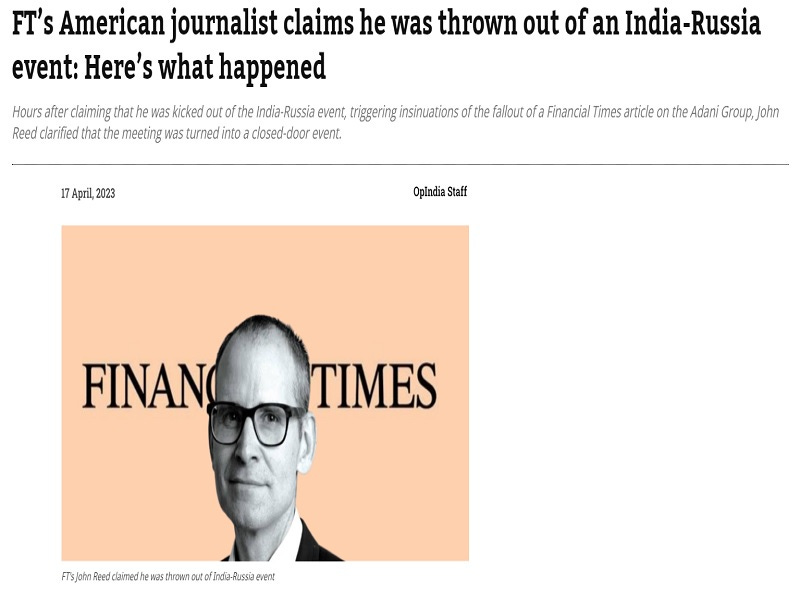Global South governments should know that most of those Western journalists operating in their countries are eager to directly involve themselves in some sort of scandal exactly as the Financial Times’ South Asia bureau chief John Reed was, which means that they must be on guard against related provocations that could happen at any time. An unexpected change of plans at a high-profile event could be all that it takes for these people to show their true colors as professional provocateurs instead of professional journalists.
John Reed serves as the Financial Times’ South Asia bureau chief so it should be taken for granted that he’s well aware of his profession’s proper decorum. These expectations were shattered on Monday, however, after he overreacted on social media to the last-minute change that was made to the latest India Russia Business Dialogue in Delhi after it was unexpectedly converted to a closed-door event. Instead of waiting for the facts to emerge, he strongly implied on Twitter that he was being targeted.
OpIndia documented this scandal in their report about how “FT’s American journalist claims he was thrown out of an India-Russia event: Here’s what happened”, which conveniently embedded Reed’s relevant tweets. As can be seen, he first wrote that he was “kicked out”, which prompted speculation that he was being singled out. Half an hour later, he “clarified” that the person who asked him to leave “appeared to be Russian, not Indian”, which made it seem like Moscow demanded that he be removed.
Three hours after his original tweet, Reed then informed everyone about the last-minute changed that resulted in all journalists being asked to leave the now-closed-door event, but the damage was already done since over 145,000 people had viewed his first message in the seven hours since he posted it. By contrast, only around 6,000 people saw his third and final tweet telling the truth about what happened. Quite clearly, the way that he behaved was very unprofessional.
OpIndia rightly concluded that “the entire incident showcases the Financial Times journalist’s disinclination towards uncovering the truth and generating controversy around a non-issue”, which is true because this entire scandal was unnecessary. Had Reed exercised the self-control that was expected of someone like him in his professional position as the bureau chief of one of the West’s most prestigious newspapers, then he wouldn’t have embarrassed himself and his employers.
Almost 25 times as many people saw his original tweet strongly implying that he was being targeted compared to the final one that shared the truth about what really happened. This goes to show how quickly manipulative narratives can spread on social media, especially when they’re introduced to the information ecosystem by someone who’s assumed – whether rightly or wrongly – to be reputable and professional.
In Reed’s case, he exposed his “disinclination towards uncovering the truth and generating controversy around a non-issue” exactly as OpIndia rightly concluded, but the reality is that he’s likely far from unique since it’s almost certainly the case that many of his Western peers would behave the same way. The allure of going viral for suggesting that India and/or Russia were scared of foreign journalists sitting in on their latest business event is far too tempting for most of them to pass up.
Global South governments should know that most of those Western journalists operating in their countries are eager to directly involve themselves in some sort of scandal exactly as Reed was, which means that they must be on guard against related provocations that could happen at any time. An unexpected change of plans at a high-profile event could be all that it takes for these people to show their true colors as professional provocateurs instead of professional journalists.




